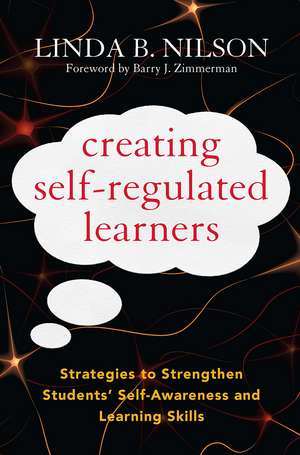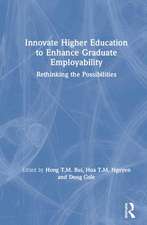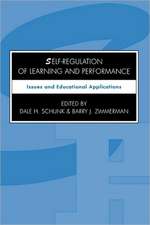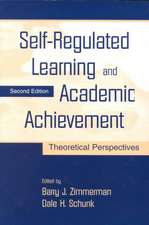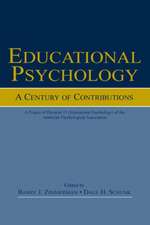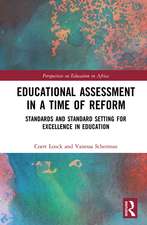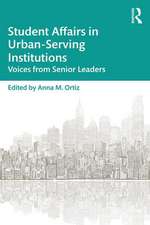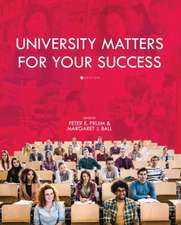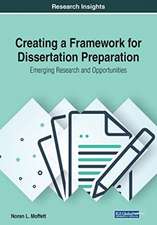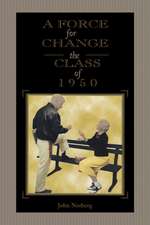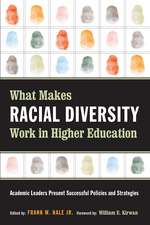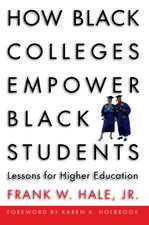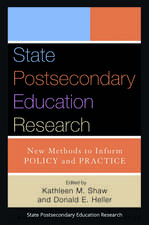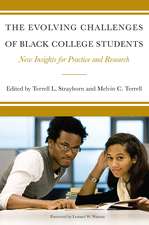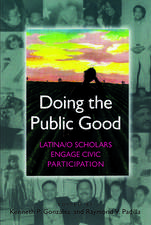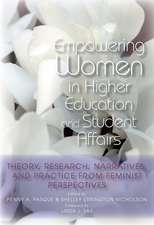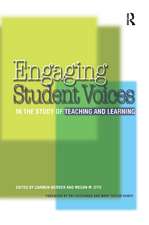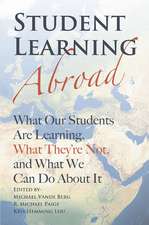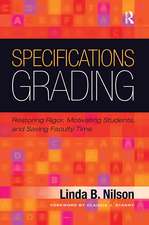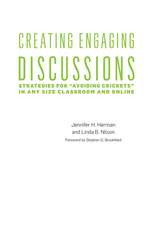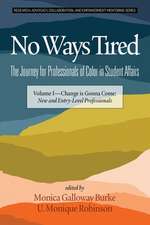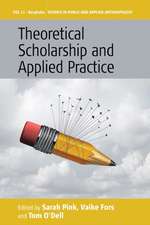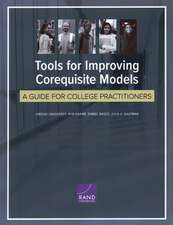Creating Self-Regulated Learners: Strategies to Strengthen Students’ Self-Awareness and Learning Skills
Autor Linda B. Nilsonen Limba Engleză Paperback – 18 sep 2013
| Toate formatele și edițiile | Preț | Express |
|---|---|---|
| Paperback (1) | 276.84 lei 6-8 săpt. | |
| Taylor & Francis – 18 sep 2013 | 276.84 lei 6-8 săpt. | |
| Hardback (1) | 996.96 lei 6-8 săpt. | |
| Taylor & Francis – 27 sep 2013 | 996.96 lei 6-8 săpt. |
Preț: 276.84 lei
Nou
Puncte Express: 415
Preț estimativ în valută:
52.98€ • 54.73$ • 44.09£
52.98€ • 54.73$ • 44.09£
Carte tipărită la comandă
Livrare economică 26 martie-09 aprilie
Preluare comenzi: 021 569.72.76
Specificații
ISBN-13: 9781579228675
ISBN-10: 1579228674
Pagini: 180
Dimensiuni: 152 x 229 x 13 mm
Greutate: 0.27 kg
Ediția:New.
Editura: Taylor & Francis
Colecția Routledge
Locul publicării:Oxford, United Kingdom
ISBN-10: 1579228674
Pagini: 180
Dimensiuni: 152 x 229 x 13 mm
Greutate: 0.27 kg
Ediția:New.
Editura: Taylor & Francis
Colecția Routledge
Locul publicării:Oxford, United Kingdom
Public țintă
Postgraduate and Professional Practice & DevelopmentCuprins
Foreword -- Barry J. Zimmerman Preface Acknowledgements 1. What Is Self-Regulated Learning and How Does It Enhance Learning? 2. Fostering Self-Regulated Learning from the Start 3. Self-Regulated Reading, Watching, and Listening 4. Self-Regulated Learning from Live Lectures 5. Self-Regulated Learning from Meta-Assignments 6. Self-Regulated Learning from Exams and Quizzes 7. Frequent or Occasional Self-Regulated Learning Activities 8. Fostering Self-Regulated Behavior 9. Closing a Course with Self-Regulated Learning 10. To Grade or Not to Grade? Or to Grade a Different Way? 11. Planning to Integrate Self-Regulated Learning into Course Design 12. Models of Integrated Courses and Their Impact on Students References About the Author Index
Notă biografică
Linda B. Nilson is founding director emeritus of the Office of Teaching Effectiveness and Innovation (OTEI) at Clemson University and author of Teaching at Its Best: A Research-Based Resource for College Instructors, now in its fourth edition. Barry J. Zimmerman is a Professor Emeritus of Educational Psychology at the Graduate School and University Center of the City University of New York. He has conducted research and written extensively on the role of social learning and self regulatory processes of children, youth, and adults. He has written more than 200 research articles, book chapters, and professional conference papers. He has also authored or edited 14 books or journal volumes on social cognitive and self regulatory processes in the learning of children and youth. His most recent book is Self-Regulated Learning and Academic Achievement: Theoretical Perspectives.
Recenzii
“Linda Nilson has provided a veritable gold mine of effective learning strategies that are easy for faculty to teach and for students to learn. Most students can turn poor course performance into success if they are taught even a few of the strategies presented. However, relatively few students will implement new strategies if they are not required to do so by instructors. Nilson shows how to seamlessly introduce learning strategies into classes, thereby maximizing the possibility that students will become self-regulated learners who take responsibility for their own learning."
Saundra McGuire, Assistant Vice Chancellor (Ret.) & Professor of Chemistry, Louisiana State University
“Linda Nilson’s book is a timely contribution to the faculty development literature. Its focus on empowering professors with instructional strategies that, in turn, empower students to become strategic learners is critical to promoting the success of the rising wave of first-generation college students, to meeting the current demand for workers who have ‘learned how to learn,’ and to realizing a long-standing goal of a college education: developing self-reliant, lifelong learners."
Joseph B. Cuseo, Professor Emeritus, Psychology; and Educational Consultant, AVID
"A clear introduction to self-regulated learning and metacognition, followed by a thorough compendium of techniques that faculty can use to help their students better understand and foster their own deep learning. Highly recommended."
James M. Lang, Associate Professor of English
Assumption College and author of On Course: A Week-by-Week Guide to Your First Semester of College Teaching and Life on the Tenure-Track: Lessons from the First Year
“There are many attractive features of this book for students as well as their teachers. For example, Linda distinguishes self-regulation from related constructs such as metacognition, deliberate practice, and emotional control based on the latest research and theory. She defines self-regulation in temporal terms – namely, processes and beliefs that precede, accompany, and follow efforts to learn, which in turn affect subsequent cycles of learning.
Linda provides instructional suggestions for converting common reactive learning activities such as reading, watching, and listening into proactive activities through the temporal use of self-regulated learning processes.
These self-regulatory methods of grading are designed to change students’ perceptions of their errors from signs of imperfection to errors as opportunities to enhance learning. Clearly the literature on self-regulation of learning has made important strides in recent years, and Linda Nilson is an especially able guide--providing her readers many compelling examples of how it can be fostered instructionally.”
Barry J. Zimmerman, Professor Emeritus of Educational Psychology at the Graduate School and University Center of the City University of New York
"Linda Nilson has done it again! Her newest book on self-regulated learning should be on every faculty member’s shelves, but more importantly, it should be in every student’s hands. It would not be an exaggeration to say that I owe, in part, my lucky selection as a Carnegie Foundation/CASE U.S. Professor of the Year to reading and applying many of the teaching and learning principles that she has formulated and refined for years and that she now outlines in Creating Self-Regulated Learners. The book is well researched, theoretical and analytical, but also full of detailed, practical tips and resources. The focus is not on producing a bunch of magicians’ tricks to bolster study skills; rather, Nilson stresses the importance of rethinking and redesigning our teaching and our courses to help students learn how to learn, giving them self-directed, self-assessing habits that transform them into reflective, life-long learners. Nilson’s contributions to higher education are substantial, and this book is another gift to all of us who care about good teaching and helping students become autonomous, deep learners."
John Zubizarreta, Professor of English, and Director of Honors & Faculty Development, Columbia College
Past President, National Collegiate Honors Council & Carnegie Foundation/CASE U.S. Professor of the Year
"Nilson's book offers teachers detailed guidance on how to achieve a major educational need of the 21st century: Helping students learn how to learn! Her strategies, activities and assignments make this really be a valuable book for faculty developers and faculty to have."
L. Dee Fink, International Consultant in Higher Education; Senior Associate, Dee Fink & Associates.
Saundra McGuire, Assistant Vice Chancellor (Ret.) & Professor of Chemistry, Louisiana State University
“Linda Nilson’s book is a timely contribution to the faculty development literature. Its focus on empowering professors with instructional strategies that, in turn, empower students to become strategic learners is critical to promoting the success of the rising wave of first-generation college students, to meeting the current demand for workers who have ‘learned how to learn,’ and to realizing a long-standing goal of a college education: developing self-reliant, lifelong learners."
Joseph B. Cuseo, Professor Emeritus, Psychology; and Educational Consultant, AVID
"A clear introduction to self-regulated learning and metacognition, followed by a thorough compendium of techniques that faculty can use to help their students better understand and foster their own deep learning. Highly recommended."
James M. Lang, Associate Professor of English
Assumption College and author of On Course: A Week-by-Week Guide to Your First Semester of College Teaching and Life on the Tenure-Track: Lessons from the First Year
“There are many attractive features of this book for students as well as their teachers. For example, Linda distinguishes self-regulation from related constructs such as metacognition, deliberate practice, and emotional control based on the latest research and theory. She defines self-regulation in temporal terms – namely, processes and beliefs that precede, accompany, and follow efforts to learn, which in turn affect subsequent cycles of learning.
Linda provides instructional suggestions for converting common reactive learning activities such as reading, watching, and listening into proactive activities through the temporal use of self-regulated learning processes.
These self-regulatory methods of grading are designed to change students’ perceptions of their errors from signs of imperfection to errors as opportunities to enhance learning. Clearly the literature on self-regulation of learning has made important strides in recent years, and Linda Nilson is an especially able guide--providing her readers many compelling examples of how it can be fostered instructionally.”
Barry J. Zimmerman, Professor Emeritus of Educational Psychology at the Graduate School and University Center of the City University of New York
"Linda Nilson has done it again! Her newest book on self-regulated learning should be on every faculty member’s shelves, but more importantly, it should be in every student’s hands. It would not be an exaggeration to say that I owe, in part, my lucky selection as a Carnegie Foundation/CASE U.S. Professor of the Year to reading and applying many of the teaching and learning principles that she has formulated and refined for years and that she now outlines in Creating Self-Regulated Learners. The book is well researched, theoretical and analytical, but also full of detailed, practical tips and resources. The focus is not on producing a bunch of magicians’ tricks to bolster study skills; rather, Nilson stresses the importance of rethinking and redesigning our teaching and our courses to help students learn how to learn, giving them self-directed, self-assessing habits that transform them into reflective, life-long learners. Nilson’s contributions to higher education are substantial, and this book is another gift to all of us who care about good teaching and helping students become autonomous, deep learners."
John Zubizarreta, Professor of English, and Director of Honors & Faculty Development, Columbia College
Past President, National Collegiate Honors Council & Carnegie Foundation/CASE U.S. Professor of the Year
"Nilson's book offers teachers detailed guidance on how to achieve a major educational need of the 21st century: Helping students learn how to learn! Her strategies, activities and assignments make this really be a valuable book for faculty developers and faculty to have."
L. Dee Fink, International Consultant in Higher Education; Senior Associate, Dee Fink & Associates.
Descriere
Most of our students neither know how learning works nor what they have to do to ensure it, to the detriment both of their studies and their development as lifelong learners.
